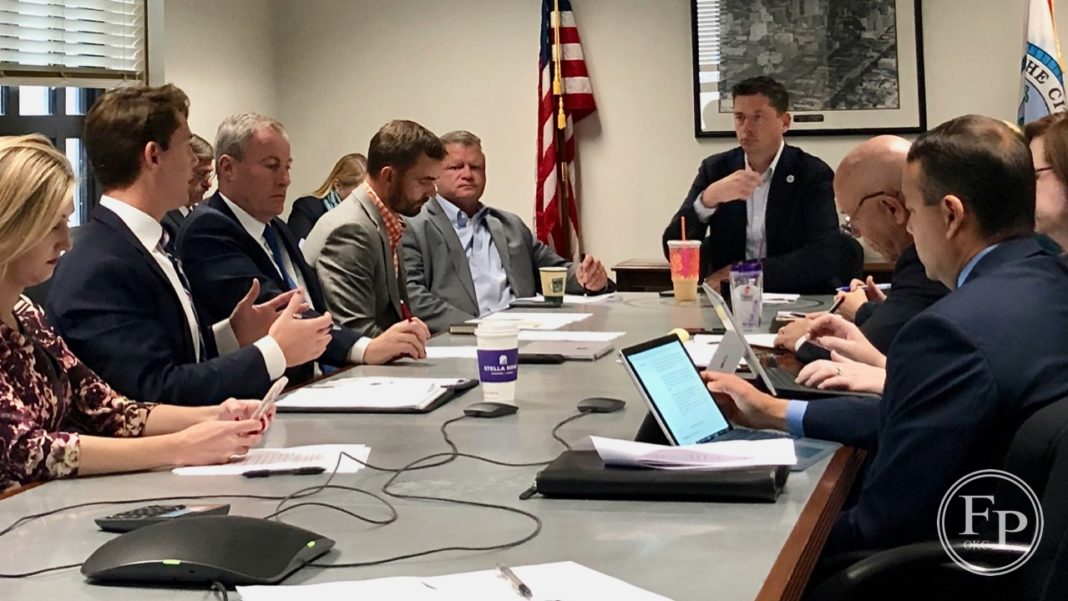Last Updated on October 29, 2019, 7:03 PM | Published: October 29, 2019
The Oklahoma City Council’s Legislative Committee met Tuesday to prepare for the coming legislative sessions at the State and Federal levels.
The Committee consists of Mayor David Holt, Ward 1 City Councilman James Greiner, Ward 3 Councilman Larry McAtee, and Ward 4 Councilman Todd Stone.
The meeting consisted of a review of priorities, initiatives, issues to support, and issues to monitor. A slate of state legislative issues and a separate slate of federal issues were amended and approved for presentation to the whole City Council soon.
Local Control
The first priority issue presented at the meeting was to maintain local control over local issues. It is the city’s position that local policy issues are best addressed through local action and regulation.
However, some lawmakers at the state level have created legislation and regulations – called preemption – to address issues in one or two communities in the state that are then applied broadly to all communities in the state.
How the sausage gets made
Local government according to columnist Marty Peercy
The State of Oklahoma has preempted local control on a number of issues.
Prime examples include preventing municipalities from raising the minimum wage or banning fracking.
It is notable that as a state senator, Mayor Holt voted to limit the ability of municipalities to regulate drilling and fracking on March 11, 2015.
The City’s position is that statewide preemption disproportionately affects Oklahoma City and Tulsa.
Heartland Flyer
One priority issue that faced some minor disagreement in Committee is the preservation of funding for the Heartland Flyer passenger rail service between Oklahoma City and Fort Worth, Texas.
Ward 1 Councilman Greiner asked why it should matter. Councilman Stone said that it is valuable as a means of transportation other than the highway and that expanding it will add value in our state.
Greiner pointed out that it’s faster for him to drive. The mayor told him he should drive, then, but that the train is near capacity for most trips.
Title 21
The Committee looked at seven issues for the recommendation of new legislation, or “initiative issues.”
Prominently, addressing law enforcement issues in Title 21 was discussed. Current legislation dictates that a person convicted of violating state drug possession laws may not carry a firearm. This leaves a loophole permitting those convicted only of municipal drug possession charges to continue carrying firearms.
Another complication of Title 21 is that one may not carry a firearm if intoxicated, but that “intoxication” is not defined in statute.
The City would also like to have policy discretion regarding the carrying of firearms at large public events in Oklahoma City. Currently, the Legislature has given municipalities have little say regarding this – another example of preemption by the state.
COTPA/EMBARK
Two initiative issues related to public transportation were addressed.
One would allow COTPA/EMBARK to license Commercial Drivers License (CDL) drivers.
Currently, there is a significant delay in CDL exams, sometimes up to 30 days. When recruiting drivers, EMBARK assists candidates in obtaining CDLs. With the lack of availability of examiners, sometimes EMBARK has to transport candidates across the state to locations that have availability at the time.
New legislation can allow EMBARK to administer CDL exams and grant licenses. This will aid in recruiting and retention of CDL required positions throughout city departments.
Streetcar Parking
A common problem for the OKC Streetcar is that there are hundreds of parallel parking spots along the 4.8 miles of track. When a car is not parked fully within the parking spot, the Streetcar is prevented from passing.
Currently, when this happens the Streetcar operator must call the police to come and write a ticket and request a tow of the vehicle. The new legislation would allow the Streetcar operator to call for a tow without the middle step of contacting the police.
There are currently 50 such blockages per month. At City Council on Tuesday, November 5, the Council will hear a request for even more parallel parking along the Streetcar route on NW 11th between Walker and Dewey.
Other Initiatives
The Committee discussed several other items for recommendation of new legislation as follow:
- Enact enabling legislation for Public Safety Districts within municipal city limits to fund public safety operations.
- Currently, cities in Oklahoma are unable to use ad valorem taxes for operations, this would allow local voters to choose to apply property taxes for safety operations.
- Clarify the statute in Title 60 governing public trusts to make it consistent with the competitive bidding act.
- New legislation is needed to clarify that public trust projects are subject to the CBA
- Clean up provisions regarding property returns, transfers and destruction orders.
- Title 11 in state statute has contradictions for how confiscated property should be dealt with.
- Preserve municipal ability to regulate residential building design standards.
- Preemptive legislation that prohibits municipalities from regulating design elements takes away one of the primary methods of a city to control land use.
Support Issues
The Committee discussed City support of the following issues:
- Efforts to enforce existing sales tax exemptions
- Retaining tools for economic development such as TIFs, tax credits, and quality jobs
- Increasing the apportionment to the Healthy Food Financing Act to address food insecurity
- Increasing resources for municipalities for infrastructure
- Currently, municipally-owned roads and bridges damaged by oil and gas production traffic are not paid for from the Gross Production Tax, as only counties are apportioned that money.
- Preserve municipalities’ ability to address derelict properties and enforce municipal codes and zoning
- Allow net metering for utility customers to receive credits for solar and wind energy systems (This is being considered by the Corporation Commission and the Legislature.)
Issues to Monitor
The Committee recommended the following issues for close monitoring by the City:
- Water rights and supply issues
- Efforts to limit dates for local elections
- State fee structure and impacts on municipal operations and projects
- Medical marijuana implementation and potential impact on municipal operations
- Competitive bidding and construction contracting
Federal Issues
The Committee also discussed federal legislative issues, largely related to FAA, Amtrak, Tinker, and air and water regulations.
The Committee’s amended slates of issues were approved by all members to be heard by the full City Council in its upcoming meeting.
Columnist covering local government in Oklahoma City and Oklahoma County from May 2019 through June 2023.










